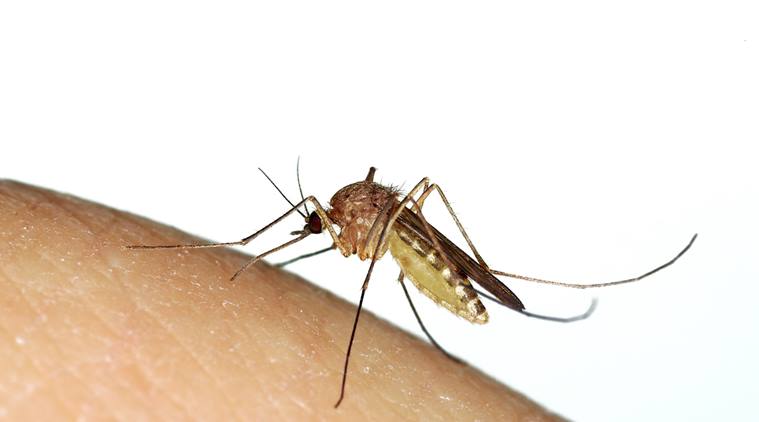📣 For more lifestyle news, click here to join our WhatsApp Channel and also follow us on Instagram
Down in jungleland: Sucker Punch
Mosquitoes have sucked the life-force out of humans for too long, but they are also the reason why rainforests are still around.
 As far as humans are concerned, mosquitoes do have their preferences — the O blood group, for example, and heavy breathers, among others. (Source: Thinkstock images)
As far as humans are concerned, mosquitoes do have their preferences — the O blood group, for example, and heavy breathers, among others. (Source: Thinkstock images)
She’ll stand there poised on your arm like a filamentous Concorde, ready for a takeoff on slanting stilettos, with a ballerina-esque name like Aedes or Anopheles or Culex. If you haven’t noticed her yet, she’ll get to work. From her slender “nose cone”, a sheath really, she’ll extend her proboscis and tap around for a capillary. Once she finds one, she’ll get to work. Four serrated stylets begin sawing in an up and down motion, and two tubular ones begin their work. Down one, flows an anti-coagulant to ensure the pricked wound continues to bleed; up another, your blood is sucked with the help of a pump in her head. A valve here shuts off this pump and another pump begins work, moving the blood to her gut, before the first one resumes pumping again. You may feel the prick as she incises the skin — and then the familiar itch as an allergic reaction starts. Soon, the familiar red weal rises on your skin. If you’re unlucky, she may have sent down the pathogens of any number of unpleasant diseases such as malaria, dengue and encephalitis into your bloodstream. These will seek out the special places in your body — like your liver — to seek sanctuary before they launch their all-out offensives. And just like that, you have been attacked by the world’s most dangerous living creature: one (or more) out of maybe 3,000 species of insects we know as the mosquito.
This little fly may account for more than a million human deaths every year. While mosquitoes prefer the tropics and are partial to rainforests such as in Africa, South and Central America and Southeast Asia, they are found worldwide. In fact, they may even emerge in the Arctic in such sky-darkening numbers that they can drain a grown man of half his blood in two hours. They’re partial to warm-blooded mammals, and home in by detecting carbon dioxide and other aromatic substances we extrude in our perspiration. And yes, as far as humans are concerned, they do have their preferences — the O blood group, for example, and heavy breathers among others (if my sister is around, they’ll go for her en masse and leave me in peace!). And while some will wail thinly in your ear as they home in on an appetizing earlobe, others attack silently. They’re not as quick-reacting as houseflies and it’s relatively easy (and very satisfying) to smack them flat as they suck from you, even though it may leave a bloody mess on the sheets.
A mosquito may drink up to three times her body-weight in blood in one session at the bar (and then stagger away, bloated). And yes, it’s only the ladies that indulge in the blood-boozing; their husbands, poor wimps, only sip nectar from flowers and plant juices. The lady needs your blood for the development of her babies, and she may lay 200 eggs 10 times during her lifetime.
Her eggs are laid in water of nearly any kind — fresh, polluted, stinking, still, running, even saline to an extent — depending on her species. It could be on the surface of a lake, a puddle, a pothole, a vase, an upturned tire and any suitable container. She prefers bloodsucking at dawn and dusk, though, of course, there are those brazen enough to do this in broad daylight, too.
We have, of course, spent billions in trying to eradicate them from the face of the earth. With every vile pesticide we come up with, they come up with an antidote, so to speak, and develop immunity, upping the ante in this arms race. There’s even one saintly species of mosquito, Toxorhynchites brevipalpis, which only attacks the larvae of the baddies, the blood-suckers, and which we’re trying to enlist as mass assassins.
So, can these blood-suckers actually do any good? Or, will the world be better off if we got rid of them completely? The thing is, they’ve already done us a huge service, though of course, many will not see it as such. For these deadly little ladies have been the true guardians of the rainforests around the world. They love the rainforests, and they’ve stopped us dead from swarming there and turning them into desiccated wastelands. The only reason why the fecund rainforests of Africa, the Amazon, and Southeast Asia are still standing is because they are “infested” with mosquitoes and other nasty disease-causing insects. Everyone knows what would happen if the rainforests were turned into strip malls. Nearer home, the Portuguese, after building the fine city of Vehla Goa, had to abandon their bustling capital and build Panaji, because they discovered, too late, that they had built the original on a “malarial swamp”.
There’s another huge favour the ladies have done us: Quinine was one of the medicines given for malaria in the tropics. Bitter to the extreme, the colonial Brits in Southeast Asia mixed it with sugar and soda to give us the basis for tonic water. Into which, of course, they added ice and a splash of gin to give rise to the world famous cocktail G&T. Interestingly, and aptly enough, G&Ts are generally considered to be a ladies’ drink. Well, what goes around comes around!
📣 For more lifestyle news, click here to join our WhatsApp Channel and also follow us on Instagram






- 01
- 02
- 03
- 04
- 05





















